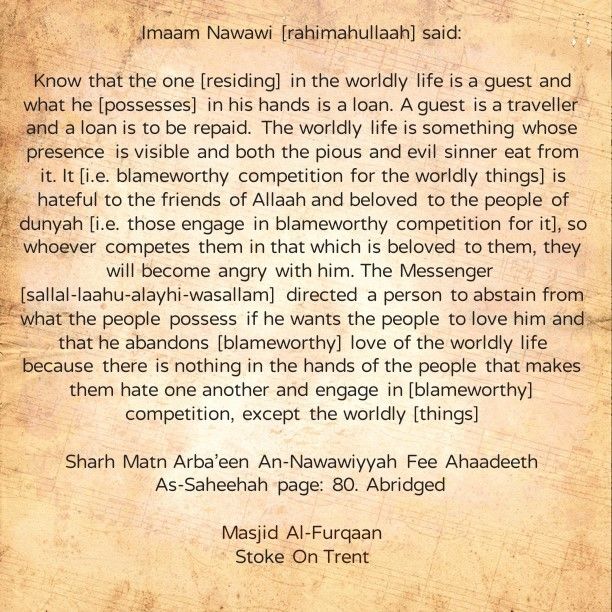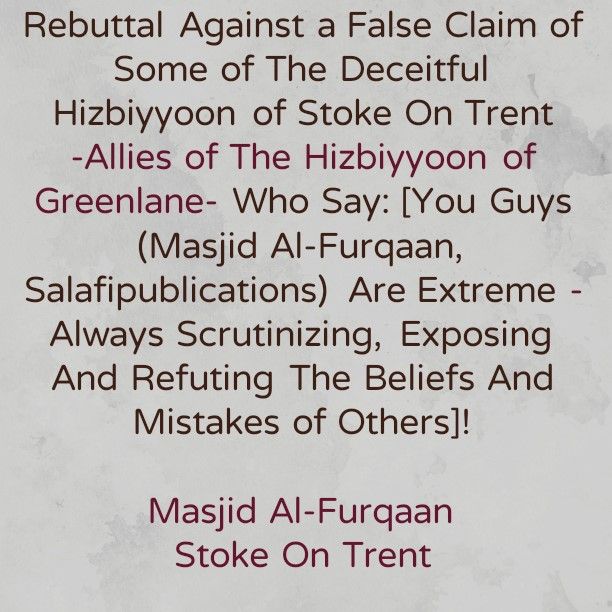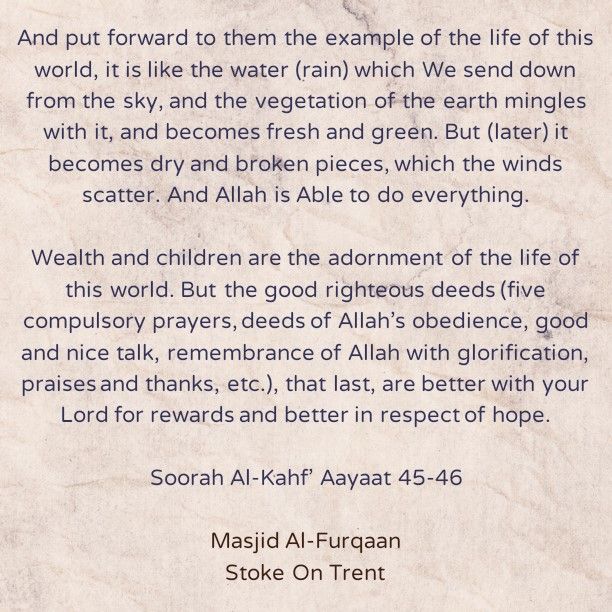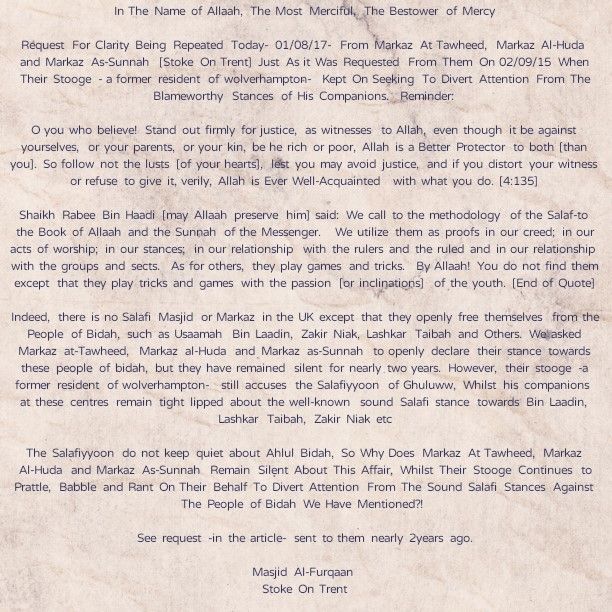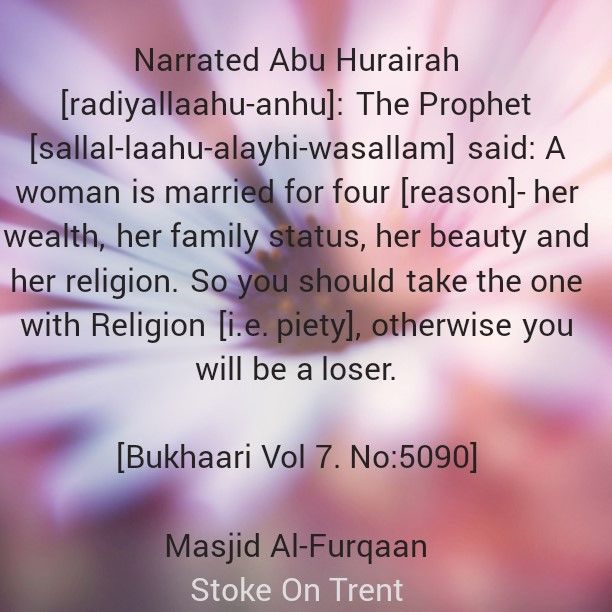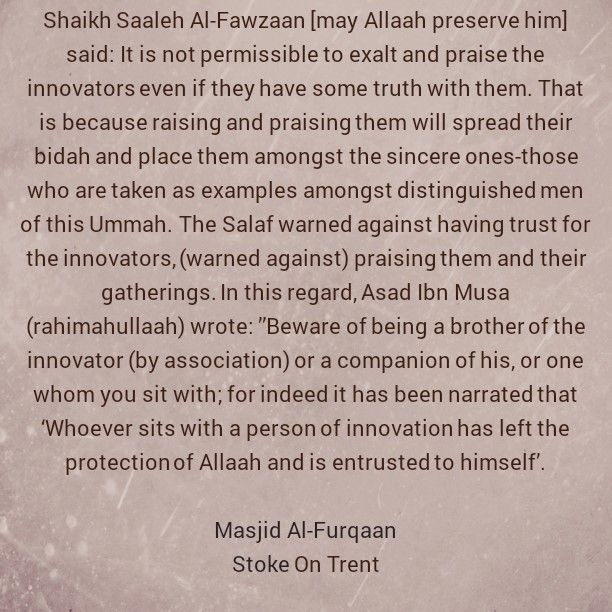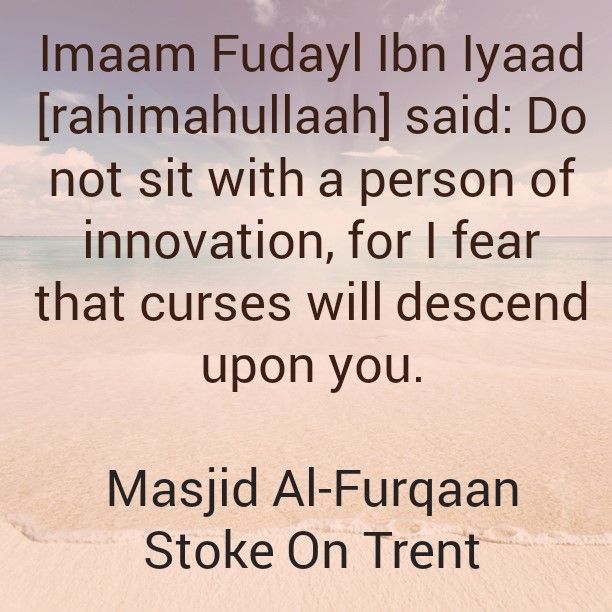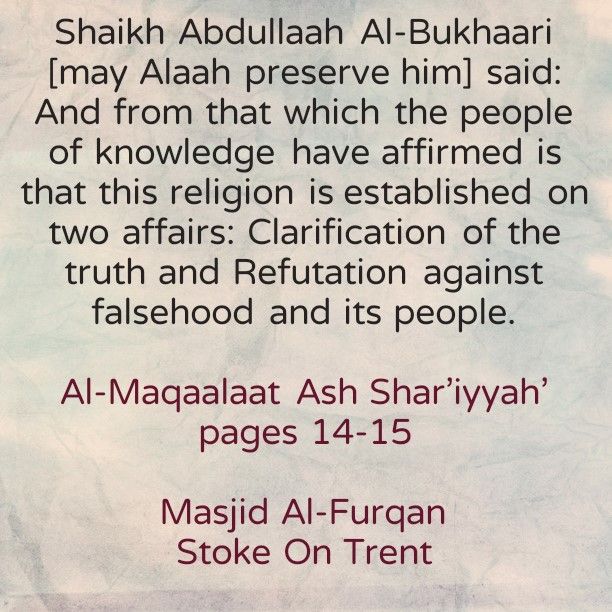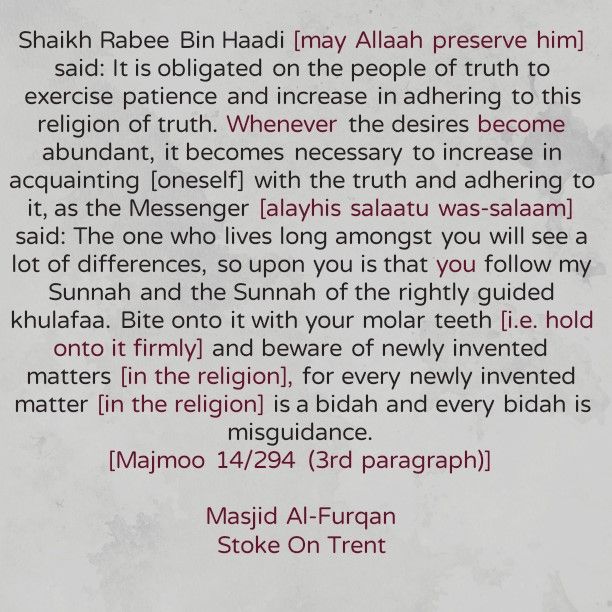Tag: protection
Educating Those Deceived And Misled By The False Claims of Some of The Hizbiyyoon of Stoke On Trent at [Markaz Al-Huda, Markaz At-Tawheed and Markaz As-Sunnah]-Staunch Allies of The Hizbiyyoon of Greenlane
Written by Jallow Abdullah on . Posted in Announcements, Calling To Islam - 'Da'wa', Refutations.
In The Name of Allaah, The Most Merciful, The Bestower of Mercy
Shaikh Muhammad Baazmool (may Allaah preserve him) said:
This statement is reiterated by some people when warning reaches them from one of the scholars or a student of knowledge against innovated statements (or views) that have occurred from some of the people, or when informed about mistakes committed in knowledge and he is warned about it; so you find that his face becomes red, his (behaviour) changes and he says, ‘’Do not scrutinize the beliefs of the people and do not search for their mistakes.’’ The reality is that this statement is truth by way of which falsehood is sought in this particular instance.
Firstly: The right place to (use this statement) is where one seeks after secrets and hidden affairs, which have neither manifested nor are there any factual evidences indicating towards that. The place (where this statement cannot be used) is where innovation arises from one of (the people) or when one of them calls to falsehood, since there is a difference between that which is manifested and that which is either concealed, hidden and unknown, or that there is no indication towards that.
Secondly: This statement of theirs will lead to the abandonment of warning against mistakes and censure against innovation and falsehood. And the meaning of this is that the common people will be beguiled, rather even some of the students of knowledge will become inattentive to this situation.
Thirdly: Was the speech of the Salaf with regards to warning against innovation and the people of falsehood not (carried out) from the angle of warning against false beliefs, innovations and affairs in opposition to the Sunnah? So how can it be said, ‘do not scrutinize the beliefs and mistakes of the people’ to a person who either warns against an innovation manifested by an individual or points out a mistake committed by an individual?
Fourthly: Scrutinizing the beliefs of the people by way of interrogation and trial as the Khaleefah Mamoon did with regards to the belief that the (Qur’aan is created), then this is an innovation that is warned against. (However) to make a clarification and (issue) warning against an innovation that some people call to, unveiling the falsehood of the callers to falsehood and warning against them, this is not from that (type of scrutiny that is warned against).
Fifthly: Those (people) who blame the one who unveils the (affairs) of the people of falsehood and issues warning against them, then it is either they disapprove innovations or do not! If they disapprove innovation, point out mistakes and falsehood, and warn against them, then indeed they have pursued the right course by the Will of Allaah (The Most High). However, why do they disapprove of those who take their place in renouncing innovation?! If they do not warn the people against falsehood, then this (i.e. behaviour or stance of theirs) is not from the methodology of the Salaf and it suffices as a rebuke against them.
Sixthly: It has been reported in Durar As-Saniyyah (1/33) that the Imaam, the Mujaddid, Muhammad Bin Abdul Wahhaab [rahimahullaah] said: I hold that the people of innovation are to be boycotted and their affair is to be made known until they repent. I pass judgement against them based on what is apparent and I leave their secrets (or hidden) affairs to Allaah. And I believe that every newly invented matter in the Religion is an innovation.
This [statement of Imaam Muhammad Bin Abdul Wahhaab [rahimahullaah] is the statement of a Salafiy Athariy [i.e. a true follower of the Salaf and the authentic narrations] that emanates from the statement of Umar Ibnul Khattaab (radiyallaahu-anhu) when he said:
‘People were (sometimes) judged by the revealing of a Divine Inspiration during the lifetime of Allah’s Apostle but now there is no longer any more (new revelation). Now we judge you by the deeds you practice publicly, so we will trust and favour the one who does good deeds in front of us, and we will not call him to account about what he is really doing in secret, for Allah will judge him for that; but we will not trust or believe the one who presents to us with an evil deed even if he claims that his intentions were good.’ [Saheeh Bukhaari; Vol 3; Hadith Number:2641]
So examine the statement of Imaam Muhammad Bin Abdul Wahhaab (rahimahullaah) when he said: ‘I judge (ahlul bidah) based upon what is apparent’‘ and examine the statement of Umar Ibnul Khattaab (radiyallaahu-anhu) when he said, ‘but we will not trust or believe the one who presents to us with an evil deed even if he claims that his intentions were good.’ Then examine the (affair) of that person who disapproves of one who warns against ahlul bidah and exposes their falsehood- claiming that (this warning against ahlul bidah) is tantamount to scrutinizing the Aqeedah of the people. Is this (statement of his) correct? Glorified and Exalted You are, O My Lord! Is not judgement passed against the people except through what is apparent?! This principle affirmed by Al Faarooq, Umar Ibnul Khattaab (radiyallaah-anhu) is employed in warning against a person of innovation when he manifests his innovation. [1]
The Stance of Imaam Ahmad towards Daawood Ibn Ali Al- Asbahaanee
Daawood Ibn Ali Al-Asbahaanee came to Saaleh Ibn Imaam Ahmad Ibn Hanbal with whom he used to have a good relationship. So he (Daawood) spoke to Saaleh Ibn Imaam Ahmad to make it easy for him to meet his father.
So Saaleh approached Imaam Ahmad (i.e. his father) and said; A man asked me to bring him to you.
Imaam Ahmad: What is his name?
Saaleh: Daawood.
Imaam Ahmad: Where is he from?
Saaleh: He is from the people of Asbahaan.
Imaam Ahmad: Has he being (involved) in fabricating anything?
At this point: Saaleh refrained from describing Daawood to his father (Imaam Ahmad). So he (Imaam Ahmad) did not stop enquiring about Daawood until he realized who he was. Then he said: Muhammad Bin Yahyaa An-Naysabooree wrote to me about this (Daawood) saying that he (Daawood) claims that the Qur’aan is something that was brought into existence (i.e. created), so do not bring him near me.
Saaleh: O my father! he (Daawood) has negated and renounced this (statement).
Imaam Ahmad: Muhammad Bin Yahyaa is more trustworthy than him. I do not give you permission to bring him to me.
O my brother! Contemplate upon the stance of Imaam Ahmad. Is this the Imaam? He is the Imaam of Ahlus Sunnah Wal Jamaa’ah in his adherence to the Sunnah of the Prophet (sallal-laahu-alayhi-wasallam) and in following the narrations of the Sahaabah; so did he use to scrutinize the beliefs of the people and seek after their mistakes?! Examine his statement and that of Umar Ibnul Khattaab mentioned earlier, ‘but we will not trust or believe the one who presents to us with an evil deed even if he claims that his intentions were good.’
Therefore, the statement of Muhammad Ibn Abdul Wahhaab [rahimahullaah] is certified by the statement of the Rightly Guided Khaleefah Umar Ibnul Khattaab [radiyallaahu-anhu] and that of Imaam Ahmad Bin Hanbal [rahimahullaah]. [2]
[1] Source: ‘Ibaaraat Moohimah’ pages 66-68- few words slightly paraphrased]
[2] Ibaaraat Moohimah’ pages: 66-69
O Allaah! Protect Us From Being Deceived By This Short Lived Worldly Life..Aameen
Written by Jallow Abdullah on . Posted in Morals and Manners - 'Akhlaaq', Purification of The Soul, Qur'aan, Worship - 'Ibaadah'.
And put forward to them the example of the life of this world, it is like the water (rain) which We send down from the sky, and the vegetation of the earth mingles with it, and becomes fresh and green. But (later) it becomes dry and broken pieces, which the winds scatter. And Allah is Able to do everything. Wealth and children are the adornment of the life of this world. But the good righteous deeds (five compulsory prayers, deeds of Allah’s obedience, good and nice talk, remembrance of Allah with glorification, praises and thanks, etc.), that last, are better with your Lord for rewards and better in respect of hope.
Clarity Required From Markaz At-Tawheed, Markaz Al-Huda and Markaz As-Sunnah About Their Stance Towards Bin Laadin, Lashkar Taibah etc Rather Than Hiding Behind Their Stooge- A Former Resident of Wolverhampton
Written by Masjid Al Furqan on . Posted in Deviated Callers & Individuals, Methodology - 'Manhaj'.
Preserve Your Salaah, Tongue and Heart!
Written by Jallow Abdullah on . Posted in Morals and Manners - 'Akhlaaq', Purification of The Soul, Worship - 'Ibaadah'.
A man came to the Prophet (sallal-laahu-alayhi-wasallam) and said: ”Admonish me and be brief’”; so the Prophet (sallal-laahu-alayhi-wasallam) said to him:
إِذَا قُمْتَ فِي صَلَاتِكَ فَصَلِّ صَلَاةَ مُوَدِّعٍ
”When you stand for your prayer, then pray a farewell prayer (i.e. as if it is your last Salah before death).”
وَلَا تَكَلَّمْ بِكَلَامٍ تَعْتَذِرُ مِنْهُ غَدًا
”Do not speak with a statement for which you may have to apologize tomorrow.”
وَأَجْمِعِ اليَأسَ مِمَّا فِي يَدَيِ النَّاسِ
”And forgo what is in the hands of the people (i.e. do not be desperate for the worldly possessions of the people9).”
Reported by:
[Imaam Ahmad (rahimahullaah) Number: 23498)]
[Imaam Ibn Maajah (rahimahulllaah) Number: 4171]
[Imaam Albaani (rahimahullaah) in As-Saheehah. Number:401]
Beauty is in the eye of the beholder, but never forget that piety always takes precedence
Written by Masjid Al Furqan on . Posted in Family & Women, Morals and Manners - 'Akhlaaq', Purification of The Soul, Worship - 'Ibaadah'.
It is impermissible to praise ahlul bidah even if they have some truth with them- [By Shaikh Fawzaan]
Written by Jallow Abdullah on . Posted in Deviated Groups, Sects and Parties, Innovations In Islam (Bidah), Methodology - 'Manhaj', Scholars of Islam, Worship - 'Ibaadah'.
Shaikh Saaleh Al-Fawzaan [may Allaah preserve him] said:
It is not permissible to exalt and praise the innovators even if they have some truth with them. That is because raising and praising them will spread their bidah and place them amongst the sincere ones-those who are taken as examples amongst distinguished men of this Ummah. The Salaf warned against having trust for the innovators, (warned against) praising them and their gatherings. In this regard, Asad Ibn Musa (rahimahullaah) wrote: ”Beware of being a brother of the innovator (by association) or a companion of his, or one whom you sit with; for indeed it has been narrated that ‘Whoever sits with a person of innovation has left the protection of Allaah and is entrusted to himself’.
The innovators must be warned against and kept away from even if they have some truth with them. Indeed, the most astray are not devoid of some truth, but as long as they have with them innovation, opposition and sinful views, it is not permissible to praise and exalt them. It is impermissible to not have an objection against their innovation because this spreads bidah, belittles the Sunnah and by way of this the innovator will emerge and become a guide for the Ummah.
As for giving consideration (to the fact) that the innovation has some truth, this does not justify praising him. This is -to a far greater extent- against what is of overriding benefit and it is known in relation to a principle in the religion that averting harm takes precedence over seeking that which is of benefit. And with regards to having hatred for the innovator, the harm that is averted from the Ummah is weightier than the benefit possessed by the innovator. And had we adhered to this concept (i.e. praising the innovator because he has some truth with him), then no one would have been judged to be misguided and declared an innovator. That is because there is not an innovator except that he has some truth and adherence to the Sunnah. The innovator (may) neither be a disbeliever nor be in opposition to all the Islamic legislation; rather he is either an innovator in some or most of the affairs. However, if the innovation is particularly related to affairs of Creed and Methodology, then the affair is dangerous indeed because it will become an example (to be followed); innovation will spread and the innovators will become active in spreading their innovation.
So, this person who praises the innovators and makes their affair obscure to the people -due to some truth they (i.e. innovators) have – is one of two (people): He is either one ignorant of the methodology of the pious predecessors and their stance against the innovators, and it is neither permissible for this ignorant one to speak nor is it permissible for the Muslims to listen to him; or he is one who has an objection to the truth because he knows the danger of innovation and the innovators, but he wishes to spread innovations. Nevertheless, this is a dangerous affair and it is not permissible to be lackadaisical with regards to innovation and its people, whatever that may be.
[Source: At-Tabdee Wat-Tafseeq Wat Takfeer. Page: 72-76. Abridged and slightly paraphrased]
Shaikh Fawzaan said: And Allaah’s Aid is Sought! At present the one who acts upon this [i.e. keeps away from ahlul bida] is Considered a secluded person etc
Written by Jallow Abdullah on . Posted in Deviated Groups, Sects and Parties, Methodology - 'Manhaj', Scholars of Islam, The Salaf - Pious Predecessors, Worship - 'Ibaadah'.
Imaam Fudayl Ibn Iyaad [rahimahullaah] said:
‘Do not sit with a person of innovation, for I fear that curses will descend upon you’
Shaikh Saaleh Al-Fawzaan [may Allaah preserve him] commented on the above statement [of Imaam Barbahaaree]: saying: [That is] because punishment, anger and deviation descend upon a person of innovation, so it is feared that you will be afflicted with some of what afflicts him, and for that reason Allaah said:
وَإِذَا رَأَيۡتَ ٱلَّذِينَ يَخُوضُونَ فِىٓ ءَايَـٰتِنَا فَأَعۡرِضۡ عَنۡہُمۡ حَتَّىٰ يَخُوضُواْ فِى حَدِيثٍ غَيۡرِهِۦۚ وَإِمَّا يُنسِيَنَّكَ ٱلشَّيۡطَـٰنُ فَلَا تَقۡعُدۡ بَعۡدَ ٱلذِّڪۡرَىٰ مَعَ ٱلۡقَوۡمِ ٱلظَّـٰلِمِينَ
”And when you (Muhammad) see those who engage in a false conversation about Our Verses (of the Qurýaan) by mocking at them, stay away from them till they turn to another topic. And if shaitaan causes you to forget, then after the remembrance sit not you in the company of those people who are the Zaalimoon (polytheists and wrongdoers)’[6:68]
And Allaah [The Most High] said to the believers:
وَقَدۡ نَزَّلَ عَلَيۡڪُمۡ فِى ٱلۡكِتَـٰبِ أَنۡ إِذَا سَمِعۡتُمۡ ءَايَـٰتِ ٱللَّهِ يُكۡفَرُ بِہَا وَيُسۡتَہۡزَأُ بِہَا فَلَا تَقۡعُدُواْ مَعَهُمۡ حَتَّىٰ يَخُوضُواْ فِى حَدِيثٍ غَيۡرِهِۦۤۚ إِنَّكُمۡ إِذً۬ا مِّثۡلُهُمۡۗ
إِنَّ ٱللَّهَ جَامِعُ ٱلۡمُنَـٰفِقِينَ وَٱلۡكَـٰفِرِينَ فِى جَهَنَّمَ جَمِيعًا
‘And it has already been revealed to you in the Book (this Qur’aan) that when you hear the Verses of Allaah being denied and mocked at, then sit not with them, until they engage in a talk other than that; (but if you stayed with them) certainly in that case you would be like them. Surely, Allaah will collect the hypocrites and disbelievers all together in Hell.’ [4:140]
In this is a warning against sitting with the people of misguidance and desires- [a warning] against sitting, accompanying and listening to their speech or reading their books. So it is upon you to be distant from these affairs. And Allaah’s Aid is Sought! At present the one who acts upon this [i.e. the one who keeps away from the people of misguidance and desires] is said to be a secluded person and a boycotter, and that he is one who harbours doubt against the people.
[It’haaful Qaaree Bitta’liqaat Alaa Sharh As-Sunnah Lil Imaam Barbahaaree.page: 318-319 Vol: 2). slightly paraphrased]
O Youth! Don’t Allow Any Mu’mayyi to Make Affairs Ambiguous, For Indeed The Deen is Based On Clarification of Truth and Refutation Against Falsehood!
Written by Jallow Abdullah on . Posted in Methodology - 'Manhaj', Worship - 'Ibaadah'.
Shaikh Abdullaah Al-Bukhaari [may Alaah preserve him] said:
And from that which the people of knowledge have affirmed is that this religion is established on two affairs: Clarification of the truth and Refutation against falsehood and its people. The affirmation of this [affair] becomes manifest to the one who contemplates on the statement of Tawheed [لا إله إلا الله] with clarification and by way of explanation. The saying of the slave (i.e. the Muslim) لا إله is a refutation against falsehood and its people-those who deify others besides Allaah. And the statement إلا الله is an affirmation of truth and a clarification of it. And it (means) that Allaah alone has the right to be worshipped and He has no partner.
Likewise, the statement محمد رسول الله is an affirmation of the Messengership of the Prophet [sallal-laahu-alayhi-wasallam] and a refutation against the one who gives him a status above that and thus deifies him; or lowers the rank of his Prophethood and Messengership.
[Source:المقالات الشرعيّة page 14-15]
Make More Effort to Learn The Truth, Especially When Bidah Becomes More Widespread
Written by Jallow Abdullah on . Posted in Methodology - 'Manhaj', Worship - 'Ibaadah'.
Make More Effort to Learn The Truth, Especially When Bidah Becomes More Widespread
